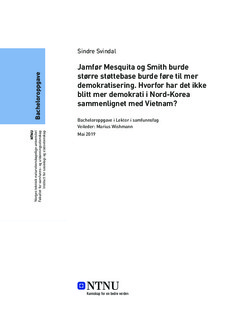| dc.contributor.advisor | Wishman, Marius | |
| dc.contributor.author | Svindal, Sindre | |
| dc.date.accessioned | 2019-09-06T14:11:38Z | |
| dc.date.available | 2019-09-06T14:11:38Z | |
| dc.date.issued | 2019 | |
| dc.identifier.uri | http://hdl.handle.net/11250/2613587 | |
| dc.description.abstract | Selectorate teori ble lansert i 2003 av Mesquita, Morrow, Siverson og Smith som en vid teori for å primært forklare demokratisering. Sentralt i selectorate teori er winning coalition. Den tiltenkte årsakssammenhengen er at desto større denne samfunnsgruppen er desto flere samfunnsgoder vil statslederen tilby befolkningen (Mesquita, Morrow, Siverson, Smith, 2003, s.53). Slike samfunnsgoder kan inneha en rekke ulike former som bedre helsevesen, bedre veier, men også mindre korrupsjon og mer innflytelse. I ettpartistater som Nord-Korea og Vietnam kan en slik form for demokratisering være en styrkning av partidemokrati slik vi så i Vietnam fra 2011. I Mesquita et al første verk fra 2003 definerer de winning coalition i sosialistiske stater som partimedlemmer og av disse to casene er det Nord-Korea som har klart flest partimedlemmer med 16.6% versus 3.7% for 2007. Nord-Korea er som vi vet, og ifølge additive polarchy, det klart minst demokratiske av de to. Denne utviklingen holder seg stabil over tid for begge casene og motbeviser Mesquita et al hypotese om at en økning i winning coalition vil føre til demokratisering (2003, s.53). | |
| dc.description.abstract | Selectorate theory was published in 2003 by Mesquita, Morrow, Siverson as a general theory in order to explain democratization. Central in sleectorate theory is winning coaltion. The causal link is that the larger the winning coaltion is the more welfare goods the government leaders will provide for the population (Mesquita, Morrow, Siverson, Smith, 2003, p.53). Such welfare goods can take on a plethora of different forms such as better public healthcare, better roads, but also less corruption and more direct influence over poltical matters. In one party states such as North-Korea and Vietnam can such a form of democratization take the shape of a reformed inner party democracy, which we saw in Vietnam in 2011. In Mesquita et al first work from 2003 they define winning coaltion in socialist state as party members and in these two cases North Korea is the one with the most party members with 16.6% versus 3.7% for 2007. North Korea is as we know, and according to the additive polarchy score, the least democratic of these two. This trend is consitent over a number of years for both cases and therefore disproves Mesquita et al hypothesis that an increase in winning coaltion will lead to democratization (2003, p.53) | |
| dc.language | nob | |
| dc.publisher | NTNU | |
| dc.title | Jamfør Mesquita et al fører økt støttebase til demokratisering: hvorfor er ikke Nord-korea mer demokratisk enn Vietnam? | |
| dc.type | Bachelor thesis | |
